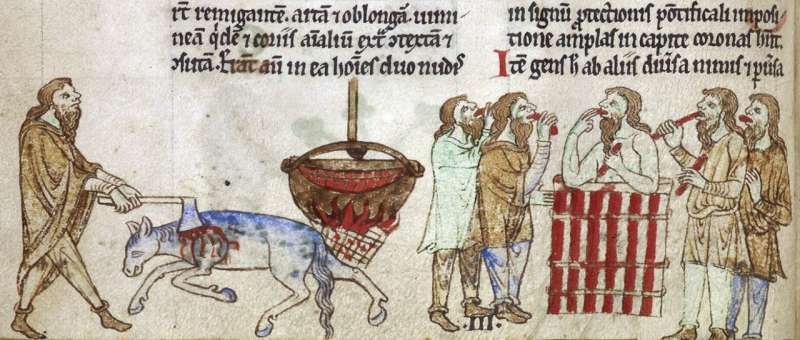Science
Archaeological Study Reveals Medieval Hungarians Ate Horsemeat Longer

Research conducted on horse remains from medieval Hungary has revealed that the consumption of horsemeat persisted long after the nation’s conversion to Christianity. This finding challenges the widely held belief that the decline in horsemeat consumption, or hippophagy, was primarily driven by religious factors. The study, led by Professor László Bartosiewicz from Stockholm University and Dr. Erika Gál, a senior researcher at the HUN-REN Research Center for the Humanities, analyzed archaeological evidence from 198 settlements throughout Hungary.
The analysis, published in the journal Antiquity, demonstrated that horse remains were still prominently found in refuse pits, indicating continued consumption of horsemeat more than 200 years after Hungary’s conversion to Christianity around AD 1000. In some rural areas, horse bones constituted as much as one third of the identifiable livestock remains in food refuse.
Early historical narratives often linked the decline of horsemeat consumption to the adoption of Christianity, suggesting that it was viewed as impure or barbaric. Though the Church never explicitly banned the practice, medieval texts frequently associated it with the customs of non-Christian peoples. The authors of the study point out that the absence of an outright prohibition, akin to the bans on pork in Judaism and Islam, indicates a complex regional diversity in attitudes toward horsemeat consumption.
In examining the findings, Bartosiewicz and Gál noted that the decline in horsemeat consumption became more pronounced after the Mongol invasion in 1241-1242. The invasion resulted in significant population losses, with estimates suggesting that between 40% and 50% of Hungary’s population perished. As a result, the Hungarian king invited settlers from the west to repopulate the area. These newcomers, being more urbanized, did not incorporate horsemeat into their diets, instead favoring pork due to its compatibility with sedentary farming.
The research highlights that the reduction in horsemeat consumption was not a result of religious or spiritual beliefs but rather due to a combination of factors including demographic shifts brought about by the Mongol invasion and the increasing scarcity of horses, which became more valued as a symbol of wealth and military strength. The study indicates that horses were often considered valuable war booty, further limiting their availability for consumption.
The conclusions drawn by Bartosiewicz and Gál underscore the importance of archaeological findings in re-evaluating historical narratives that have often been shaped by cultural biases and misconceptions. As the authors state, “Tropes equating hippophagy with ‘barbarity’ have abounded since antiquity.” This perspective highlights the need for a nuanced understanding of historical dietary practices that reflects the complex interactions among different peoples and their environments.
In summary, the research provides compelling evidence that horsemeat consumption in medieval Hungary persisted well into the Christian era, driven by social and economic factors rather than religious condemnation. This challenges the prevailing narrative and illustrates the dynamic nature of dietary customs influenced by historical events and cultural exchanges.
-

 Entertainment2 weeks ago
Entertainment2 weeks agoAndrew Pierce Confirms Departure from ITV’s Good Morning Britain
-

 Health4 months ago
Health4 months agoFiona Phillips’ Husband Shares Heartfelt Update on Her Alzheimer’s Journey
-

 Health4 months ago
Health4 months agoNeurologist Warns Excessive Use of Supplements Can Harm Brain
-

 Science2 months ago
Science2 months agoBrian Cox Addresses Claims of Alien Probe in 3I/ATLAS Discovery
-

 Science2 months ago
Science2 months agoNASA Investigates Unusual Comet 3I/ATLAS; New Findings Emerge
-

 Entertainment1 week ago
Entertainment1 week agoGogglebox Star Helena Worthington Announces Break After Loss
-

 Science2 months ago
Science2 months agoScientists Examine 3I/ATLAS: Alien Artifact or Cosmic Oddity?
-

 Entertainment1 month ago
Entertainment1 month agoTess Daly Honoured with MBE, Announces Departure from Strictly
-

 Entertainment2 months ago
Entertainment2 months agoLewis Cope Addresses Accusations of Dance Training Advantage
-

 Entertainment5 months ago
Entertainment5 months agoKerry Katona Discusses Future Baby Plans and Brian McFadden’s Wedding
-

 Science2 months ago
Science2 months agoNASA Investigates Speedy Object 3I/ATLAS, Sparking Speculation
-

 Entertainment5 months ago
Entertainment5 months agoEmmerdale Faces Tension as Dylan and April’s Lives Hang in the Balance









